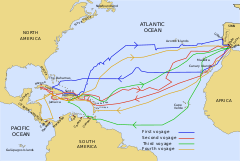
Back رحلات كولومبوس Arabic Entdeckung Amerikas 1492 German سفرهای اکتشافی کریستف کلمب Persian Pelayaran Christopher Columbus ID Viaggi di Cristoforo Colombo Italian Pelayaran Christopher Columbus Malay د کرسټوفر کولمبس سفرونه Pashto/Pushto Potovanja Krištofa Kolumba Slovenian Путовања Кристифора Колумба Serbian கிறித்தோபர் கொலம்பசின் அமெரிக்கக் கடற்பயணங்கள் Tamil
| Part of the Age of Discovery | |
 The four voyages of Columbus (conjectural) | |
| Date | 1492, 1493, 1498 & 1502 |
|---|---|
| Location | Americas |
| Participants | Christopher Columbus and Castilian crew (among others) |
| Outcome | European discovery and colonization of the Americas |
Between 1492 and 1504, the Italian navigator and explorer Christopher Columbus[a] led four transatlantic maritime expeditions in the name of the Catholic Monarchs of Spain to the Caribbean and to Central and South America. These voyages led to the widespread knowledge of the New World. This breakthrough inaugurated the period known as the Age of Discovery, which saw the colonization of the Americas, a related biological exchange, and trans-Atlantic trade. These events, the effects and consequences of which persist to the present, are often cited as the beginning of the modern era.
Born in the Republic of Genoa, Columbus was a navigator who sailed in search of a westward route to India, China, Japan and the Spice Islands thought to be the East Asian source of spices and other precious oriental goods obtainable only through arduous overland routes.[1] Columbus was partly inspired by 13th-century Italian explorer Marco Polo in his ambition to explore Asia. His initial belief that he had reached "the Indies" has resulted in the name "West Indies" being attached to the Bahamas and the islands of the Caribbean.
At the time of Columbus's voyages, the Americas were inhabited by Indigenous Americans, and Columbus later participated in the beginning of the Spanish conquest of the Americas. Columbus died in 1506, and the next year, the New World was named "America" after Amerigo Vespucci, who realized that it was a unique landmass. The search for a westward route to Asia was completed in 1521, when the Magellan expedition sailed across the Pacific Ocean and reached Southeast Asia, before returning to Europe and completing the first circumnavigation of the world.
Cite error: There are <ref group=lower-alpha> tags or {{efn}} templates on this page, but the references will not show without a {{reflist|group=lower-alpha}} template or {{notelist}} template (see the help page).
- ^ "Christopher Columbus | Royal Museums Greenwich". www.rmg.co.uk. Retrieved November 15, 2023.